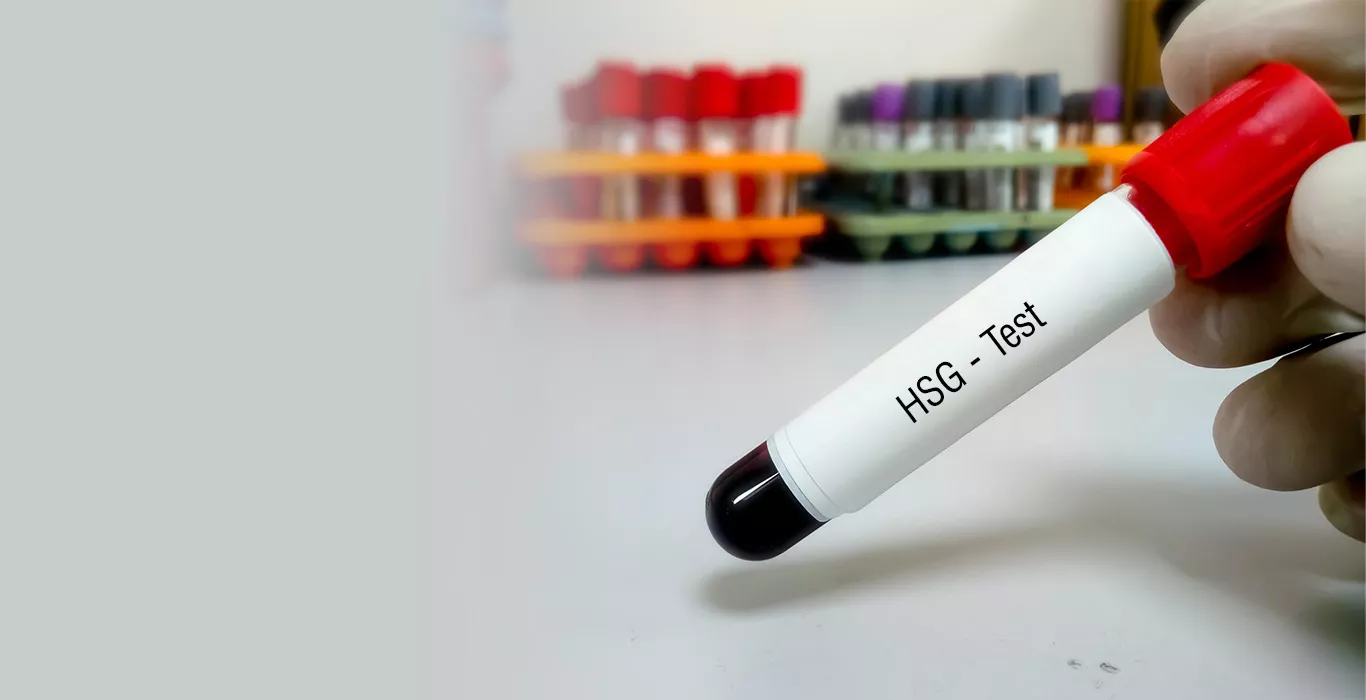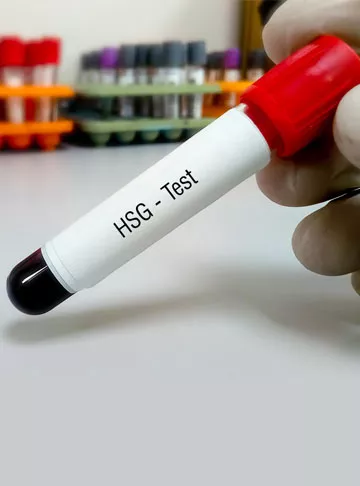The Hysterosalpingogram or HSG is a diagnostic test that plays a crucial role in evaluating the health of a woman's reproductive system. Primarily used to assess the condition of the fallopian tubes and uterus, the HSG Test Procedure provides valuable insights into potential issues that may be hindering a woman's ability to conceive. In this article, we will understand the HSG test process in detail including HSG procedure steps, its duration and preparation to what to expect during and after the test.
How Long Does the HSG Procedure Take?
The HSG procedure is relatively quick and usually takes around 15 to 30 minutes to complete. It is typically performed in an outpatient setting, either in a hospital or a fertility clinic, and does not require an overnight stay. While the test itself is short, the preparation and recovery time should also be taken into consideration.
How to Prepare for the HSG Test?
1. Timing: The HSG procedure is usually performed within the first 10 days of the menstrual cycle. This is to ensure that the woman is not pregnant and to obtain clearer images of the reproductive organs.
2. Medications: Inform your healthcare provider about any medications or supplements you are taking, as some may need to be adjusted before the test.
3. Pain Relief: Taking over-the-counter pain relievers before the procedure can help manage potential discomfort.
4. Hygiene: You may be instructed to cleanse the vaginal area before the procedure to reduce the risk of infection.
5. Support: It's advisable to bring your partner or family member with you for emotional support and to drive you home after the test.
What to Expect Before an HSG Test?
Before the HSG test, you will have a consultation with your healthcare provider. This is an opportunity to discuss any concerns, clarify doubts, and understand the procedure better. Your medical history will be reviewed, and you'll be asked about any allergies or previous adverse reactions to contrast dye. This information helps ensure a safe and successful procedure.
Step-by-Step Process of the HSG Test
Below are the steps involved in the HSG Procedure:
1. Preparation:
- Before the procedure, your healthcare provider will likely advise you to schedule the HSG test within the first 10 days of your menstrual cycle. This timing ensures that you're not pregnant, allowing for more accurate results.
- Inform your healthcare provider about any allergies you may have, especially to contrast dye, to prevent adverse reactions.
- You might be recommended to take over-the-counter pain relievers, before the procedure to manage potential discomfort.
- Maintain proper hygiene by cleansing the vaginal area before the test to minimise the risk of infection.
2. Catheter Insertion:
- You will be asked to change into a hospital gown and lie down on an examination table.
- Similar to a Pap smear, a speculum is gently inserted into the vagina to visualise the cervix.
- A thin and flexible catheter is then carefully guided through the cervix and into the uterus. This catheter serves as a conduit for the contrast dye to be injected.
3. Contrast Dye Injection:
- Once the catheter is in place, a contrast dye is slowly injected into the uterus through the catheter.
- The contrast dye is a liquid that is visible on X-ray images, allowing for enhanced visualisation of the reproductive organs.
- As the dye fills the uterus, it begins to flow into the fallopian tubes, which helps identify any blockages or abnormalities within them.
4. Imaging:
- As the contrast dye moves through the reproductive organs, a series of X-ray images are taken.
- These X-ray images capture the shape, size, and condition of the uterus and fallopian tubes.
- The images provide valuable information about the presence of any blockages, abnormalities, or structural issues that could affect fertility.
5. Completion:
- Once the necessary images have been obtained, the catheter is gently removed.
- The procedure is now complete, and you will be provided with any necessary aftercare instructions.
- It's a good idea to have your partner or family member accompany you to provide emotional support and assist you after the procedure.
What to Expect During an HSG Test?
During the HSG test, you may experience some discomfort, such as cramping and a sensation of pressure. This discomfort is often brief but varies from person to person. It's important to communicate with the healthcare provider performing the test about any discomfort you're experiencing so they can make adjustments if necessary.
How Many Days of Rest Are Required After the HSG Test?
After the HSG test, most women can resume their normal activities immediately. However, it's recommended to avoid strenuous exercise, heavy lifting, and sexual intercourse for a day or two to prevent any potential complications. Some women may experience mild spotting, but this is generally temporary.
What to Expect After an HSG Test?
Following the HSG test, you may experience some changes and sensations. These can include:
1. Discharge: Some women notice a slight increase in vaginal discharge after the procedure. This is typically due to the contrast dye and should subside within a day or two.
2. Cramping: Mild cramping or discomfort may persist for a short time after the procedure. Over-the-counter pain relievers can help alleviate this discomfort.
3. Fertility Boost: Interestingly, some women report an increased chance of conception in the months following an HSG test. This could be due to the flushing effect of the dye potentially clearing any minor blockages in the fallopian tubes.
A Word of Advice from Indira IVF on the HSG Process
At Indira IVF, a renowned fertility clinic, we emphasise the importance of being well-informed and actively engaged during the HSG procedure. We recommend that patients equip themselves with knowledge, ask questions, and maintain open conversations with their medical professionals. This approach not only alleviates concerns but also facilitates a smoother journey towards addressing fertility concerns effectively. If you're seeking comprehensive fertility solutions, our experienced team at Indira IVF is here to guide you through every step of your journey. From diagnostics to personalised treatment plans, we're committed to helping you achieve your dreams of parenthood. Reach out to us at 18003092323 and take the first step towards your fertility treatment.
Pregnancy Calculator Tools for Confident and Stress-Free Pregnancy Planning
Get quick understanding of your fertility cycle and accordingly make a schedule to track it















